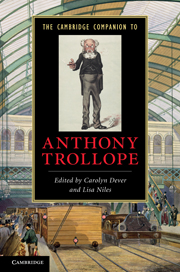Book contents
- Frontmatter
- Introduction
- 1 Trollope’s Literary Life and Times
- 2 Trollope As Autobiographer And Biographer
- 3 Trollope’s Barsetshire Series
- 4 The Palliser Novels
- 5 Trollope Redux: The Later Novels
- 6 Trollope’s Short Fiction
- 7 Trollope And The Sensation Novel
- 8 Queer Trollope
- 9 The hobbledehoy in Trollope
- 10 The construction of masculinities
- 11 Vulgarity and money
- 12 Trollope and the law
- 13 Trollope and travel
- 14 Trollope and the Antipodes
- 15 Trollope and Ireland
- 16 Trollope and America
- Further reading
- Index
- Cambridge Companions to . . .
12 - Trollope and the law
Published online by Cambridge University Press: 28 March 2011
- Frontmatter
- Introduction
- 1 Trollope’s Literary Life and Times
- 2 Trollope As Autobiographer And Biographer
- 3 Trollope’s Barsetshire Series
- 4 The Palliser Novels
- 5 Trollope Redux: The Later Novels
- 6 Trollope’s Short Fiction
- 7 Trollope And The Sensation Novel
- 8 Queer Trollope
- 9 The hobbledehoy in Trollope
- 10 The construction of masculinities
- 11 Vulgarity and money
- 12 Trollope and the law
- 13 Trollope and travel
- 14 Trollope and the Antipodes
- 15 Trollope and Ireland
- 16 Trollope and America
- Further reading
- Index
- Cambridge Companions to . . .
Summary
To talk of Anthony Trollope and the law might be to invoke the obvious. Like many of his Victorian counterparts, but even more so, his novels are famously (and infamously) populated with legal actors: solicitors, barristers, judges, and jurors, with the odd criminal and breacher of contract thrown in for good measure. The law also provides the novels with well-wrought plot lines, often involving social and communal regulation of property, and in particular, landed property and questions of inheritance. In addition, Trollope, whose novels exalt truthfulness, honor, and honesty, frequently mined the crimes of forgery and perjury for his plots and for the moral edification he sought to bestow on his readers. All of these have made him a perennial favorite in law-and-literature scholarship from the days of his contemporary reviewers (who so reveled in pointing out his legal errors, especially in Orley Farm, that he famously sought legal counsel for The Eustace Diamonds) to the present. It is perhaps a testament to Trollope’s attempts at verisimilitude and his vivid realism that some of his novels have been treated as real-life legal cases, analyzed by lawyers and legal scholars for their insight into their legal questions.
Trollope’s novels are also renowned for their social observation and their precise portrayal of interpersonal and group interactions. Arguably, no other Victorian author or critic was as aware of the community’s ability to make meaning or portrayed these intricate processes as skillfully. But his texts are more than entertaining novels of manners and social mores; the social interactions portray a mode of communal self-regulation and a subtle if rigorous determination of norms.
- Type
- Chapter
- Information
- The Cambridge Companion to Anthony Trollope , pp. 155 - 167Publisher: Cambridge University PressPrint publication year: 2010
- 2
- Cited by



